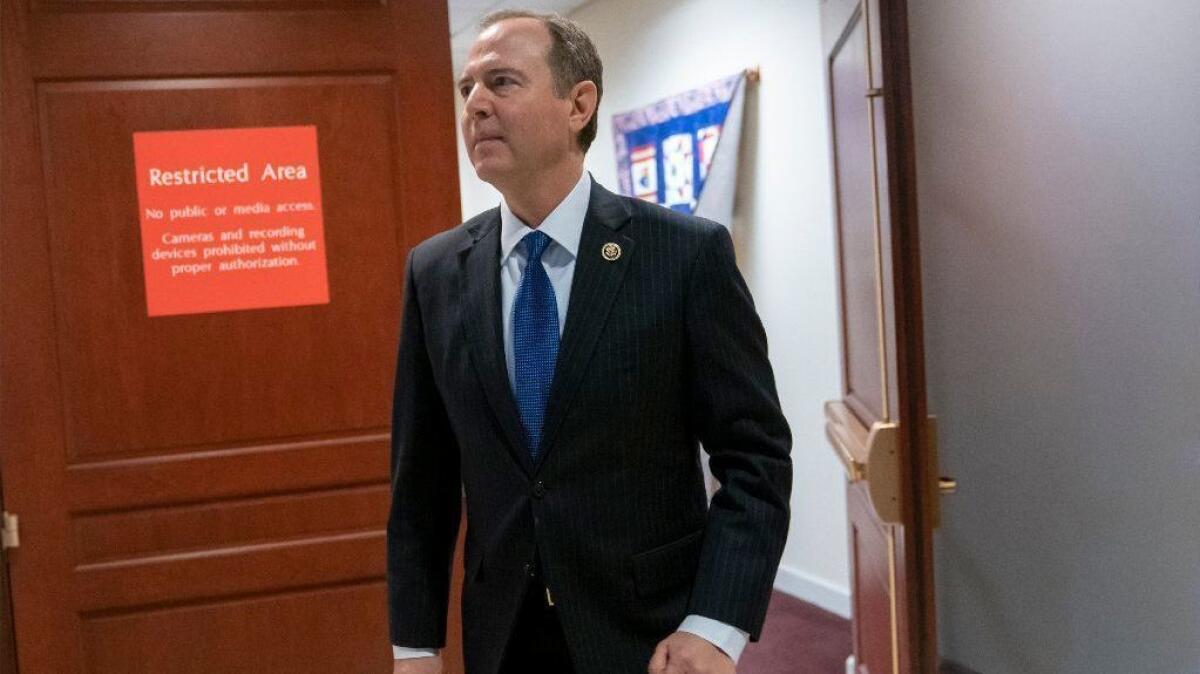Dueling investigations by Congress and Justice Department threaten faith in government

- Share via
Now this is what you call divided government.
Americans have grown used to the idea of the two major parties splitting control of the White House and Congress. In fact, voters seem to prefer things that way; one-party control rarely lasts long in Washington these days (see, e.g., the elections in 2018 and 2010). But what we’re seeing now is two parties pitting the institutions they control against one another in remarkable ways.
The clash threatens to make the public even more distrustful of government and major public institutions. Yet we’ve been heading in this direction for years, pushed by political factions such as the tea party and Occupy Wall Street that paint the federal government as a wholly owned subsidiary of evil forces, whether it be “the elite,” “the swamp” or corporate America.
Today’s situation may look like the typical partisan battling in the run-up to a presidential election. What’s different is the weapons being used in the fight.
On one side you have House Democrats with their impeachment inquiry into President Trump, which they launched without the optional but customary vote of the full House. Impeachments are by their nature highly partisan exercises, but so far the current one — which focuses on whether Trump abused the power of his office by pressuring Ukraine to investigate one of his top political rivals — is overwhelmingly so.
On the other side you have the Trump administration, which has instructed its agencies and employees to stonewall the impeachment inquiry. At the same time, the Justice Department has stepped up its efforts to substantiate Trump’s preferred counter-narrative: that Democrats alternately colluded with Russians and Ukrainians to try to swing the 2016 election to Hillary Clinton.
Those efforts take the form of a criminal investigation that Atty. Gen. William Barr ordered into the roots of special counsel Robert S. Mueller III’s investigation into whether Russia colluded with Trump’s presidential campaign in 2016. In the notorious July 25 phone call with new Ukrainian President Voldymyr Zelensky, Trump pressed Zelensky to help the Justice Department run down rumors that Russian agents weren’t the ones who’d hacked into the Democratic National Committee’s computers during the 2016 presidential campaign; instead, under this factually challenged conspiracy theory, that evidence was concocted by Ukrainians.
If the Department of Justice somehow declares that Mueller and the U.S. intelligence community wrongly blamed Russians for the DNC hack, that could make Trump’s request for “a favor” from Zelensky seem more palatable. Or if it finds that the Mueller probe was built on a house of cards assembled by Democrats, that would aid Trump’s argument that the impeachment inquiry is just an extension of Democrats’ efforts to overturn the 2016 election.
Meanwhile, the Justice Department’s inspector general has been conducting a lengthy investigation of his own into the FBI counterintelligence probe that led to Mueller’s appointment. His report has already been submitted to Barr, so all or part of it may become public soon.
Ideally, the competing investigations would yield consistent results about their overlapping topics, particularly by refuting the conspiracy theories surrounding Ukraine and the Mueller probe. That would be a tremendous boon to the credibility of all concerned. If they don’t, the public will find itself having to choose whose facts to believe: those assembled by House Democrats, based mainly on the input of career diplomats, or those gathered by the federal government’s top law enforcement agency.
That’s not a tough choice for partisans on both sides. As my colleague Mike McGough noted earlier on this blog, Democrats have already raised red flags about Barr’s objectivity. But for people in the middle, it would be an invitation to throw up one’s hands and say, “A pox on both your houses.” It also would send a disturbing signal that partisanship has corrupted some of the federal government’s most serious undertakings.
The Justice Department has been conducting its probes outside of public view, as Mueller did his. The fact that House Democrats have done the same with their impeachment inquiry, though, has drawn sharp rebukes from Trump and other Republicans, who contend that the president is being denied his due process rights. That’s led Republicans to try to undermine the inquiry, even though Republicans are participating in the private hearings being held by three House committees. Dozens of House Republicans interrupted a deposition the committees were trying to conduct Wednesday (the witness was eventually deposed), and key Senate Republicans have threatened to summarily dismiss any House-passed articles of impeachment.
You’ve got to suspect that one reason Republicans are complaining is because they want to have subpoena power, something the minority doesn’t typically have the unilateral power to wield. And how would Republicans use that power? Presumably to shift the focus away from Trump and onto another of the president’s preferred Ukrainian narratives: that former Vice President Joe Biden corruptly shielded a Ukrainian energy company that employed his son by forcing the country’s parliament to fire its top prosecutor. The facts don’t serve that narrative well either.
House Intelligence Committee Chairman Adam B. Schiff (D-Burbank) has said that the initial hearings are being conducted behind closed doors to prevent witnesses from colluding, and that the committee will soon shift to public sessions featuring many of the same witnesses. Still, my colleagues and I on the Los Angeles Times editorial board have criticized the lack of transparency and the lack of a formal authorization vote, which have weakened the public’s faith in the process.
House Democrats clearly have the authority to do what they’re doing; the Constitution gives them carte blanche to establish their own rules for impeachment, which is neither a criminal proceeding nor a trial. With the Justice Department’s competing investigations potentially coming to a head at the same time, though, the credibility of the House process is every bit as important as the results it produces.
More to Read
A cure for the common opinion
Get thought-provoking perspectives with our weekly newsletter.
You may occasionally receive promotional content from the Los Angeles Times.










